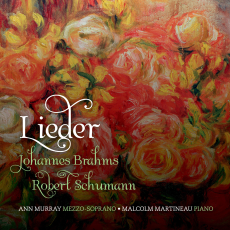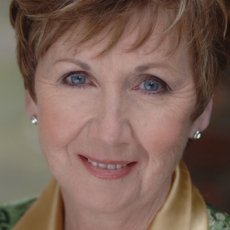Ann Murray - Brahms & Schumann: Lieder - MusicWeb International
We
learn from a note on the Linn Records website that this is to be Dame Ann Murray's valedictory Lieder recording. The disc is something of a
family affair because it includes contributions from Ann Murray's son, Johnny
Langridge - a tenor like his distinguished father - and from pianist, Hester
Dickson, the mother of Malcolm Martineau. Two other singers, Benjamin Appl and
John Mark Ainsley, also take part. Unfortunately the otherwise excellent
documentation gives no clue as to who performs in which number so whilst it's
easy to tell when Ann Murray herself or Benjamin Appl is singing the rest is
unclear. After doing some determined digging on the Linn website I was able to
establish that Malcolm Martineau and Hester Dickson provide the duet
accompaniment for Murray in Hoch, hoch sind die Berge; Martineau plays everything else. Ainsley is Murray's
partner in Ich denke Dein and she sings with her son in Familien-Gemalde.
The programme is well chosen; the songs suit Ann
Murray's voice extremely well and it should be said straightaway that even if
this is to be her last recording there is no evidence that I could detect of
declining powers.
The bulk of the programme consists of music by
Schumann. The Gedichte der Königin Maria Stuart, Schumann's last set of solo songs, make an ideal opening.
In the very first of these songs, ‘Abscheid von Frankreich' Murray offers
lovely, warm tone and clarity of diction; these qualities will be consistent
throughout the recital. She engages with the words and music fully yet without
any unwarranted exaggeration. In that first song she conveys Mary's regret as
she leaves France for Scotland. She's excellent, too, in ‘Abschied von der
Welt' where her performance is moving. The concluding ‘Gebet', Mary's prayer on
the eve of her execution, is delivered with fine feeling. This is a super
account of these five songs.
Murray and Benjamin Appl share the Lieder und Gesange aus 'Wilhelm Meister'. Her singing continues on the same
high level that we experienced in the Mary Stuart songs while Appl makes a very
favourable impression. His is a well-focused voice and his sound is pleasing.
His first contribution is ‘Ballade des Harfners', which he puts across very
well; he tells the story. Murray sings ‘Nur wer die Sehnsucht kennt' with
affecting expression after which Appl and Martineau inject a fine sense of
drama into ‘Wer nie sein Brot mit Tränen aß'. Later, Appl has ‘An die Türen
will ich schleichen', aptly described in the notes as "the epitome of terse
tragedy that barely knows itself to be tragic." Here Appl is intense and I
admired his thoughtful delivery of the song, the emotion well controlled.
Murray's duet with John Mark Ainsley is charming -
and charmingly done. I'm less taken with the duet that she sings with her son.
Johnny Langridge has a good voice and the partnership with his mother is
effective. The trouble is that I don't find the music desperately interesting;
it sounds a bit ‘domestic'.
To close the recital Ann Murray and Malcolm
Martineau treat us to seven Lieder by Brahms. Murray is beautifully
poised in her delivery of the touching Dein blaues Auge halt so still. The poem which Brahms set in Junge Liebe I is by Felix Schumann, the last of
Robert and Clara's children. Brahms was the boy's godfather and this song was a
Christmas gift to Clara. Murray is ardent and eager in her delivery and
Martineau matches her approach. The vocal line takes Murray up to the top of
her compass quite a bit and the gleam is still there.
I like the lightness of touch that both musicians
bring to Standchen and I also appreciated Murray's
lovely rendition of Wie Melodien zieht es. To close the programme she offers the celebrated Wiegenliedand what
a nice, gentle envoi to her recording career this
performance is. Murray's singing is touching but in no way sentimental.
This disc may be a farewell to the recording
studio but so far as I know Ann Murray has no plans to retire fully, which will
be welcome news for her many admirers. This fine singer leaves us with an
excellent last recording which is completely up to the high standards of her
distinguished career. Her various collaborators all make strong contributions
too, not least Malcolm Martineau, who accompanies with all his customary
understanding, flair and empathy for the music. Philip Hobbs has engineered -
and produced - a very successful recording; I like the balance he has achieved
between voice and keyboard. There's a comprehensive essay on the songs and all
the texts and translations are set out clearly.


